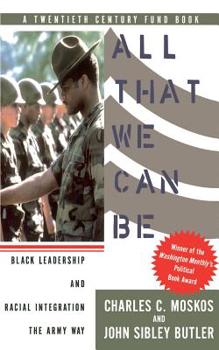All That We Can Be: Black Leadership and Racial Integration the Army Way
Select Format
Select Condition 
Book Overview
The foremost autorities on race relations in the armed forces recount the previously untold success story of how the U.S. Army became the most integrated institution in America. Charles C. Moskos and... This description may be from another edition of this product.
Format:Paperback
Language:English
ISBN:0465001130
ISBN13:9780465001132
Release Date:August 1997
Publisher:Basic Books
Length:224 Pages
Weight:0.57 lbs.
Dimensions:0.5" x 5.4" x 8.1"
Customer Reviews
2 ratings
Excellent Description of Success in the Military Life
Published by Thriftbooks.com User , 18 years ago
Moskos and Butler do an excellent job of describing how the Army has done a much better job than other American institutions at racial integration. Unlike a few of the previous reviewers, I did not feel that the authors claimed that the Army had done it perfectly, or that there was complete racial harmony. In fact, I think the authors were fairly clear that the Army was far from perfect. Instead, they argue that the Army is one of the best, if not the best, examples we have. Further, Moskos and Butler do a great job of operationalizing or articulating, the steps the Services used and are using. These concrete examples are extremely valuable when evaluating whether other institutions can follow in the Army's footsteps or not. One of the strengths of the book is that both Moskos and Butler are uniquely qualified to write about the military. Both served in the Army as soldiers (not officers), both are professors who study the military, and both continue to stay in contact with the Army. In short, they are in a position to blend personal experience, academic analysis and recent events.
America can benefit from race-savvy;not color-blind policies
Published by Thriftbooks.com User , 25 years ago
Can It Be This Simple?All That We Can Be: Black Leadership and Racial Integration the Army Way by Charles Moskos and John Sibley ButlerReviewed by Robert Gest III a senior faculty member of The Federal Executive InstituteThis book by Moskos and Butler indeed provides a somewhat different solution to the race problem in America; one that I, and I am sure, many others desperately wish could succeed. As a personal friend of both authors, an Afro-American, and a veteran of thirty years in the US Air Force, I read their book with a somewhat biased eye. I believe in Moskos' views of cohesion and community and I know he fervently believes in the solvability of the race issue in this country. However, I found myself reading, accepting many of the arguments of the book, yet ending with a morbid melancholy about the feasibility or soundness of their ultimate argument.The position that the Army takes which focuses on behavior rather than attitudes is probably one of the few tenable perspectives to take on leading an organization populated by both white and black Americans. Sociologists tell us that attitudes and values cannot be legislated. Such an effort is more likely to harden the positions of people who have come by these attitudes and values from the people and institutions they trust the most. Our parents, churches, friends are instrumental in the formation of our early values and attitudes. And, as many accept, these become part and parcel of who we are at a relatively early age. I like the view of Morris Massey whose seminal work, Who You Are is Where You Were When. Here he argues that short of a Significant Emotional Event, a S-E-E if you will, we are not likely to experience a major shift in attitudes/values. Perhaps the Army, in its effort to ensure harmony, unity, combat effectiveness, presents its newly-entered soldiers with what amounts to a SEE. The Army makes it crystal clear what its expectations are and subsequently brooks little or no deviation. The emphasis is on behavior which can be observed; not on attitudes. Is it possible that this focus makes that much difference? It would seem so. A war story is in order. In Boot camp during the Fall of 1959, I had the honor of serving as "Barracks Chief" which meant that when the Drill Sergeant went home for the evening, I was "in charge". I had an assistant who like me, was from the Deep South. After about two weeks into an eleven week basic training experience, the assistant and I were sitting on the stoop of the barracks building, discussing a variety of things. Unexpectedly he confided or confessed that had anyone told him three weeks before that he would be sitting with a "nigra", talking as equals and feeling benefitted by the dialogue, he would have called them a "damned liar". His experience with Afro-Americans had been largely confined to the maid and yard man who came to his parents' home to work. Therefore, his world view (rea




